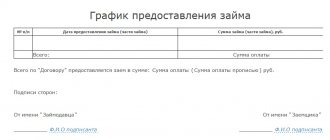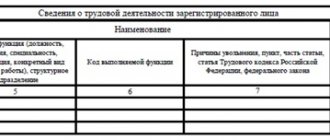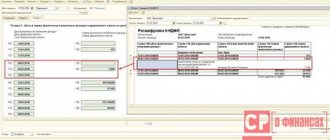Inspection of individual entrepreneurs by the tax inspectorate Every individual entrepreneur, regardless of the form of taxation (general or simplified), is a taxpayer of taxes and fees. In this regard, each individual entrepreneur can be checked by an inspectorate using the existing audit methodology and its types.
And further about what types of tax audits for individual entrepreneurs exist in the Russian Federation in accordance with the Tax Code of the Russian Federation and what is the algorithm for conducting them.
Who checks? What are they checking?
Many citizens think that an individual entrepreneur may be subject to an inspection from any supervisory authority at any moment in order to take him by surprise, so they are in no hurry to open their own business. In fact, this is a misconception, since most inspections are carried out in accordance with a predetermined schedule, which can be found on the website of the Prosecutor General's Office.
The regulatory framework on the issues of inspections, their terms, rights and obligations of the parties is prescribed in Law No. 294-FZ of December 26, 2008 “On the protection of the rights of legal entities and individual entrepreneurs in the exercise of state control (supervision) and municipal control.” In accordance with this law, the dominance of supervisory authorities has been abolished, businessmen are checked at regular intervals. In addition, there is a moratorium on inspections of small businesses in 2019, so new entrepreneurs will only be disturbed after 3 years of work. In this case, the visit of inspectors may take place much later. Government agencies practice a risk-based approach. The schedule includes businessmen whose reports or activities are questionable.
There are a lot of federal supervisory services, each area of activity has its own, but for individual entrepreneurs the most common are:
- Federal Tax Service;
- Rospotrebnadzor;
- Department of Economic Security of the Ministry of Internal Affairs;
- Ministry of Emergency Situations;
- Rostrud;
- Rostechnadzor;
- Prosecutor's Office;
- Roskomnadzor;
- Rostransnadzor;
- Roszdravnadzor;
- Rosselkhoznadzor.
If one of these services comes to an individual entrepreneur, then the first thing that will interest the employees is whether he is legally or illegally engaged in business activities, and whether he has received permits. Therefore, all primary documents, such as the Unified State Register of Individual Entrepreneurs, extracts, licenses, should always be kept at hand. What else do federal services often check?
Federal Tax Service
Control activities of the tax service are not included in the publicly available list of inspections. It is impossible to know in advance about the auditors' visit. Law 294-FZ does not apply to this type of supervision, as is directly stated in its first article. However, the appearance of inspectors can be predicted based on the order of the Federal Tax Service of the Russian Federation No. MM-3-06 / [email protected] dated 05.30.07.
Those businessmen who submit “zero” reports or pay wages to hired workers below the minimum wage are most often subject to individual entrepreneur tax audits. If during a desk audit, inspectors simply correspond with the taxpayer, sending requests for the presentation of certain documents, then during an on-site audit, the internal audit of activities will be checked on site and in more depth. Federal Tax Service employees will be most interested in:
- documents confirming expenses, if the individual entrepreneur is on the simplified tax system “Income-Expense” or unified agricultural tax;
- completeness of income reflection;
- documents confirming payment of duties for importing goods from abroad;
- compliance with cash discipline;
- coincidence of the average number of employees with the actual number;
- the validity of the costs taken into account when calculating obligations to the budget;
- accuracy of calculation of insurance premiums from labor payments;
- reality of transactions;
- accuracy of formation of tax registers, primary reporting, etc.
All verification activities can last from 2 to 6 months. If necessary, they can be suspended or extended. The rules are regulated by Chapter 14 of the Tax Code of the Russian Federation.
Attention! The law prohibits tax officials from checking the same tax more than once during a tax period. Even a closed entrepreneur can be checked during the first 3 years after cessation of work, especially if he is in debt.
Rospotrebnadzor
The service monitors compliance with the consumer’s rights to receive quality goods, and monitors compliance with sanitary standards in places where goods and services are sold. Therefore, Rospotrebnadzor inspections are often carried out at points of sale of food products and in catering establishments. To avoid violations, the organizer of such enterprises must strictly monitor:
- so that there are no expired products on the shelves;
- for proper storage of perishable products;
- that cooks in the kitchen have sanitary certificates and special clothing;
- for the presence of all price tags on the shelves;
- so that any consumer has access to a book of complaints.
An unscheduled inspection can be triggered by gross violations, the consequence of which was, for example, mass poisoning of people. The client can also file a complaint with Rospotrebnadzor about the presence of expired products in the store, unsanitary conditions, etc. This can even be done through the official website of the department.
It is also worth remembering that in 2021 the service received the right to conduct test purchases. Inspectors can appear at the point of sale under the guise of ordinary buyers (Law 81-FZ of 04/18/18).
Ministry of Emergency Situations
In connection with the latest tragic events in the shopping center in Kemerovo, the topic of fire safety is especially relevant. A wave of inspections from the fire inspectorate is quite expected not only in crowded places, but, in general, in all institutions that people visit. It will not be surprising if after this many property owners will have to organize a fire prevention system in accordance with the law, and not pay off the authorities, as was the case before.
Control is carried out by territorial divisions of the Ministry of Emergency Situations of the Russian Federation in accordance with the inspection schedule for 2021. The supervision procedure is established by Administrative Regulation No. 323 of June 14, 2016. Unscheduled visits by auditors are allowed in the event of complaints or information about threats appearing in the media.
You should pay special attention to the following things:
- There must be a fire extinguisher in each room, and the person in charge must be able to use it.
- Fire safety briefings for personnel should be carried out regularly.
- Information must be displayed in a visible place: telephone number of the Ministry of Emergency Situations (01, 010), instructions for detecting a fire, evacuation plan.
- There should be exit signs and stairs hanging in the premises. All emergency exits must be open.
- The fire alarm must be in working order.
- The finishing of walls, ceilings and floors of evacuation corridors should not be flammable.
Important! Under no circumstances should fire safety be neglected! It’s better to organize everything conscientiously once than to deal with dire consequences later.
Everything you need to know about desk checks
A tax audit of a non-travelling individual entrepreneur should cover only the reporting period covered by the submitted declaration. Inspectorate employees do not have the right to check another reporting period. The audit begins from the moment the reporting documentation is submitted to the fiscal authority. It can start immediately, or over a certain period.
Background information: to initiate a desk audit, you do not need a decision from the head of the inspection (unlike an on-site scheduled or unscheduled inspection).
Based on the results of control and audit, employees of regulatory authorities have the authority to request from individual entrepreneurs or LLC employees clarification documentation or an explanation regarding the correctness of the information provided and calculations made. The taxpayer is required to respond to such a request within 5 business days of receipt of such notice.
There are situations when, within such a period, an individual entrepreneur cannot draw up an explanation, eliminate an error, or take other actions. In any case, you should not ignore the notification from the Federal Tax Service. It is better to respond later than not to respond at all.
How will Federal Tax Service employees act if the taxpayer remains inactive:
- They will draw up a report on the identified violation;
- They will make a decision to hold the individual entrepreneur accountable;
- Penalties and fines will be charged.
To avoid problems, it is better to immediately respond to all requests from fiscal authorities. The likelihood that mistakes will be corrected peacefully is high.
Every individual entrepreneur should also know: if the verification of an existing individual entrepreneur is not carried out due to late submission of reports (the delay in filing papers is exceeded by more than 10 days), then Federal Tax Service inspectors, by decision of the head, have the authority to block the company’s bank accounts.
The camera always passes through the location of the inspection. The audit algorithm is as follows:
- Analysis of the information provided. The inspector checks the logic and consistency of the information presented, the relationship between tax and accounting reporting indicators;
- Checking the arithmetical accuracy of all calculations presented in the declaration;
- Mandatory verification of all tax deductions declared in the declaration (see tax benefits for individual entrepreneurs). Checking the feasibility and rationality of their use;
- The correctness of application of various tax rates is checked.
Interesting information! According to the results of the first half of 2018 alone, 4.32 million inspections were carried out in Moscow, and at the end of 2021 this figure amounted to 7.54 million.
Rostrud
The service is designed to protect the rights of the working population. Most people already know that an owner who refuses to officially register employees for work is violating their rights. As a result of such actions, their work experience is not taken into account, insurance premiums are not paid, pension points are not accumulated, so they only need to work under an official contract.
In accordance with the Labor Code, the employer must have the following documents in order:
- second copies of employment contracts with signatures;
- employment orders;
- staffing and time sheets;
- vacation schedule;
- entries in work books.
Particular attention is also paid to:
- employees must be at least 16 years old;
- respect for the rights of pregnant women, they cannot be fired;
- working conditions.
In addition to the Federal Tax Service, Rostrud may also be interested in too small a salary. The employer will have to explain things to the authorities, or urgently increase the employees' salaries. The gap between payments cannot exceed 14 days, so an advance must be paid.
The labor inspectorate has the right to visit enterprises on a schedule or unscheduled. The inspection rules are established by order of the Ministry of Health and Social Development of the Russian Federation No. 1325n dated 07.11.11.
The remaining services check narrower areas of activity: Rostechnadzor - industrial safety, Rostransnadzor - transportation of passengers and cargo, Roszdravnadzor - production of medicines, the work of pharmacies, etc.
After the closure of the IP
It is precisely in connection with the statute of limitations of documents that the question often arises about how legal it is to check an individual entrepreneur after closure? The established practice, including judicial practice, is such that the right of tax authorities to conduct on-site inspections is recognized even after a citizen ceases his entrepreneurial activity.
At the same time, most courts proceed from the fact that the tax authorities should initiate an audit when closing an individual entrepreneur immediately after submitting the corresponding application. The review period also covers a three-year period.
If any violations are detected, the citizen will be held liable as established by law and the termination of his business activity does not matter.
Thus, verification of the activities of individual entrepreneurs is constant from the moment of registration until the termination of this status, as well as after that. However, maintaining transparent accounting and compliance with tax discipline provide peace of mind to the entrepreneur during any audit of his activities.
Back to contents
Inspections: types, grounds, timing
An attempt at a unified classification of supervisory activities was made by the authors of Law 294-FZ. Chapter 2 of the federal act is devoted to types of audits. The division is made according to the following criteria:
- Periodicity. Officials can visit a company or entrepreneur according to a pre-approved schedule or on an extraordinary basis.
- Type. Control is carried out in documentary (office) or on-site form.
In practice, activities are also classified according to the type of inspecting entity, topic, duration, volume of information (selective and continuous).
Throughout the country, unified monitoring and drawing up an inspection plan is carried out by the Prosecutor General's Office. Therefore, on the department’s website you can easily view individual entrepreneur inspections for 2021, the plan and schedule of upcoming inspections. All supervisory authorities transmit information there centrally. By indicating a minimum of information about himself (full name, INN, OGRNIP), the entrepreneur will be able to find out who will come to him for a scheduled inspection, in what month, what type of inspection will be (on-site or with documents), how long it will take last.
Until the end of 2021, representatives of small and medium-sized businesses are on “testing holidays” (Article 26.2 of Law 294-FZ). Exceptions are provided for the following categories:
- entities carrying out risky types of commercial and production activities (hazard classes);
- representatives of particularly important social spheres (medicine, education, etc.);
- violators of administrative legislation who have not confirmed the execution of previously issued orders;
- license holders.
In addition, the holidays do not apply to supervision in the areas of radiation safety, state secrets, audits, assay activities and the use of atomic energy.
Attention! Entrepreneurs who have previously committed serious violations are also under special surveillance by the authorities.
Other entrepreneurs do not have to worry about scheduled inspections for now, however, unscheduled inspections have not been cancelled. Especially if there are good reasons for it. Their list is established by part 2 of Art. 10 of Law 294-FZ:
- The deadline by which the businessman had to correct the previously identified violations had approached.
- The entrepreneur has decided to engage in activities that require a separate license or permit.
- If the supervisory authority has received appeals from citizens, former clients of the person being inspected, indicating violations of consumer rights, a threat to their life and health, damage to monuments, historical buildings, or provoking an emergency situation.
- The inspection is carried out on the basis of a separate separate order issued within the framework of the Decree of the President of the Russian Federation, the Government or the Prosecutor's Office.
The duration of each type of inspection is determined by Art. 13 of the same federal act:
| View | term |
| Documentary | 20 days |
| Visiting | 20 days |
| Scheduled visit | 50 hours for small and 15 hours for micro enterprises |
In rare cases, when additional specialists and independent experts are involved in verification activities, the period may be extended twice.
Fines when checking individual entrepreneurs
For violation of deadlines for submitting tax reports, 5 percent of the amount of tax not paid on time for each full or partial month of delay, but not more than 30 percent of the specified amount and not less than 1,000 rubles (Article 119 of the Tax Code of the Russian Federation). If the declaration is not submitted on time, but the tax is paid, then the fine will be only 1,000 rubles (clause 18 of the resolution of the Plenum of the Supreme Arbitration Court of the Russian Federation dated July 30, 2013 No. 57, letter of the Ministry of Finance of Russia dated August 14, 2015 No. 03-02-08/47033).
For providing false information, a tax agent can be fined 500 rubles for each document with incorrect information (Article 126.1 of the Tax Code of the Russian Federation).
For failure to provide documents upon request during a desk or field inspection - a fine of 10,000 rubles (Clause 2 of Article 126 of the Tax Code of the Russian Federation).
For non-payment or incomplete payment of tax, individual entrepreneurs will be assessed a fine in the amount of 20% to 40% of the unpaid tax amount (Article 122 of the Tax Code of the Russian Federation) plus a penalty for each day of delay in the amount of 1/300 of the refinancing rate. Currently, the refinancing rate is equal to the key rate and is 7.75 percent.
For gross violation of the rules for accounting for income and expenses (Article 120 of the Tax Code of the Russian Federation), the tax inspectorate will impose a fine in the amount of:
- 10,000 rubles for violations during one tax period (quarter or year);
- 30,000 rubles if the rules were violated for longer - two or more tax periods;
- 20% of the amount of unpaid tax, but not less than 40,000 rubles, if because of this the tax was underestimated, as Bukhonline writes.
Completing the scan
The result of the audit is formalized in the form of a report, where the inspector describes all identified violations. This is a very important document that the individual entrepreneur must thoroughly study before signing. The business owner has the right to disagree with what is written on paper and, in the presence of his lawyer, to add objections to the act for further appealing the results of verification measures. The rules for expressing disagreement with the conclusions of tax inspectors are regulated by tax legislation. An entrepreneur can express his point of view in a separate document within 1 month from the date of delivery of the act (Article 100 of the Tax Code of the Russian Federation).
Administrative and criminal liability
Violations identified during inspection activities can lead to administrative and even criminal liability. An entrepreneur who wants to organize his own business in accordance with all the rules and eliminate all violations should carefully study Chapter 14 of the Code of Administrative Offenses of the Russian Federation, the norms of the Labor Code, if he has workers, and also avoid the formation of tax debts and pay insurance premiums on time.
Important! As you know, for large and especially large tax debts (900,000 and 4,500,000 rubles, respectively), you can go to “places that are not so remote.” Criminal punishment is provided for in Art. 198 of the Criminal Code of the Russian Federation.
In most cases, violations are recognized as administrative offenses. Most often, the inspector identifies the following from the individual entrepreneur:
- illegal business activity (without tax registration);
- lack of license or permit;
- violations of sanitary standards;
- illegal sale of alcohol-containing products without excise taxes;
- work without using CCT when required by law;
- fire safety violations;
- presence of unregistered employees.
Even if inspectors have identified some shortcomings in a businessman, there is no need to despair. The first time, as a rule, he is given a warning and given time to fix the problem. Only gross violators are punished with fines.
How to avoid
Tax audits of entrepreneurs are carried out systematically, and they cannot be avoided in any case. At the very least, all individual entrepreneurs’ reports are subject to desk audit, and failure to submit them is detected and leads not only to the payment of a fine, but also to the danger of the entrepreneur being included in the list for on-site inspections.
Therefore, first of all, it is worth observing tax discipline and submitting all necessary reports in a timely manner and making payments required by law. In this case, the risk of ordering an on-site inspection is minimal.
In addition, it is always necessary to be prepared for a possible visit from inspectors, especially since tax authorities are now required to inform business entities about the upcoming inspection, including the subject of the inspection.
Back to contents
How to prepare and protect yourself from inspection?
For most people, the word “check” evokes unpleasant associations. This procedure is always associated with increased hassle. However, you should not think that since government officials came with an audit, they have unlimited rights and can arrive without warning at any time of the day. When a small business owner knows his rights well, he will feel more confident when communicating with inspectors.
Attention! Representatives of supervisory services must exercise their powers only in the personal presence of the entrepreneur or his authorized representative. Salaried employees cannot give explanations on behalf of the manager. They have the right to communicate with inspectors only within the framework of their job description.
During control activities, the individual entrepreneur has the right:
- require inspectors to show their identification;
- familiarize yourself with the order on the basis of which the inspection is carried out;
- conduct video or audio recording of events;
- maintain an audit log to record the frequency and subject of audits;
- include your objections in the inspection report and do not sign it until the lawyer arrives.
- In addition, he has responsibilities, neglect of which will only aggravate the situation:
- you must submit all requested documents;
- open access to all office premises of the individual entrepreneur;
- do not interfere with the audit.
A legally savvy person who has a good idea of how an audit should be carried out, for how long, and what documents the auditors should have in their hands, will find it easier to appeal the audit results if he does not agree with them. And it’s quite possible to do this; a businessman will only need to provide evidence of the following facts:
- the period between scheduled inspections has not been maintained (3 years);
- if the inspection is planned, then it must be carried out in accordance with the schedule of the prosecutor’s office without exceeding the duration;
- the inspectors did not have identification documents or orders with them;
- the documentation of the procedure was violated: the act was not drawn up.
The process of challenging the audit results must begin with the use of pre-trial measures: an entrepreneur can file a complaint with a higher authority of the body that audited him. You must keep the second copy with the mark. The period for consideration of a complaint is 30 days. If no one answers the citizen during this time, he has the right to solve his problem in court. Such disputes are considered by the Arbitration Court.
Important! Supervisors continually review practices. It is becoming increasingly difficult to appeal decisions on formal grounds. The servants of Themis will certainly take note of the procedural shortcomings. However, the main issue at the meeting will be to clarify the reality of the offenses for which a sanction has been imposed.
If the verification procedure is violated
Any audit of a business is carried out by people, and all people, as we know, can sometimes make mistakes. A slight deviation from the inspection procedure established by law can play into the hands of a businessman - the results of such an inspection can be challenged.
An inspection may be considered illegal if:
- Scheduled inspections are carried out more often than once every three years;
- The scheduled inspection was not in the official schedule on the prosecutor's office website;
- The inspection deadlines specified in the order have been violated or its maximum duration has been exceeded;
- The inspectors did not present an order to conduct an inspection (or there was none at all);
- The auditors demanded the provision of documents or samples that were not related to the subject of the audit;
- At the end of the inspection, no report was provided.
Results
In order to improve conditions for small businesses, the frequency of inspections is strictly regulated. The control covers periods of no more than 3 years. Additionally, businessmen are given vacations. The moratorium does not cover only the most critical activities.
Even at the stage of drawing up a business plan, the future entrepreneur should think through all the details and organize the business in such a way as to prevent violations. Those who do not know what documents are needed to verify an individual entrepreneur should familiarize themselves with the listed regulations and keep the most important documentation at hand.
Moratorium on IP verification: is it valid or not?
Many people are concerned about the question: is there a moratorium on individual entrepreneur inspections in effect in 2021? Let us remind you that from January 1, 2021, in order to develop small and medium-sized businesses in Russia, scheduled inspections have been eliminated. The period of such moratorium was set for a period of 3 years. Accordingly, it should be terminated this year.
But Federal Law No. 480 was adopted, which extended the moratorium. Scheduled inspections of individual entrepreneurs will not be carried out in 2021. This ban applies only to representatives of small businesses included in the unified register. If an enterprise does not meet the criteria of a small business and is not included in the register, then it may be subject to control. Desk audits continue to be carried out.
Thus, representatives of small businesses can relax this year, since the moratorium on inspections has been extended. But desk audits will continue to be carried out, so you need to know everything about them in order to avoid problems.
This might also be useful:
- Unified agricultural tax for individual entrepreneurs and organizations
- simplified tax system for individual entrepreneurs in 2021
- Tax system: what to choose?
- Patent tax system in 2021
- Calculation of income tax from salary
- General taxation system for individual entrepreneurs
Is the information useful? Tell your friends and colleagues
Dear readers! The materials on the TBis.ru website are devoted to typical ways to resolve tax and legal issues, but each case is unique.
If you want to find out how to solve your specific issue, please contact the online consultant form. It's fast and free!
Tax audits: concept, regulation, goals
Among several types of tax control specified in Article 82 of the Tax Code of the Russian Federation, tax audits come first. From which it follows that such audits are the main tool of the fiscal authority when carrying out control actions.
Tax audit is a set of regulatory acts aimed at studying the calculation of tax collection amounts for payment to the state budget. It is carried out by comparing the actual information derived from control calculations and the figures provided by the taxpayer when declaring taxes.
Based on Article 31 of the Tax Code of the Russian Federation, the right to conduct audits is granted to the Federal Tax Service of the Russian Federation, and audit actions are regulated by Chapter 14 - “Tax control”. At the same time, the responsibility of inspectors includes not only tax audits. So-called non-tax audits include actions of the regulator regarding the use of cash registers, state regulation of the sale of alcohol, licensing, etc.
The systematization of audit actions is based on the scope of powers of the Federal Tax Service of the Russian Federation available during inspections, and restrictions on certain steps: the possibility of passage, access to premises, examination, seizure of documentation, etc. Checks carried out by the tax regulator can be divided into the following types:
- directly tax, which include: desk audits - audits that are carried out by the Federal Tax Service at the place of registration of the individual entrepreneur, without traveling to the address of the organization being audited;
- on-site audits that are carried out at the place of business activity of an individual entrepreneur on the initiative of the tax authority, inspectors in this case have expanded powers;
- counter-actions - actions aimed at comparing two copies of the same paper (invoices exchanged between counterparties, TTN, etc.).
- audits conducted in accordance with additional requirements of the Tax Code of the Russian Federation;
Let's figure out what audit actions employees of the control apparatus have the right to perform.
All tax returns of individual entrepreneurs are subject to desk audit, two general exceptions are a special declaration of legal entities and the period of tax monitoring
What to do if the document does not pass the verification of the counterparty’s certification
1C: Accounting 8 provides a convenient base for checking a counterparty. Banks also offer unique services for this process. So Raiffeisen Bank has created a convenient, extensive program for working with documents that are transferred to the bank. You can view it on the company’s website with the domain ru. Here, counterparties are also checked automatically in real time. To work with such programs, you need an Internet connection.
If the counterparty still does not pass the verification, then it is necessary to make an official request for additional information, to find out for what reasons the errors could have occurred. In the absence of objective reasons, communication with such counterparties must be stopped.
You can learn more about how counterparties are verified in this video:
List of individual entrepreneur documents
Below is a list of documents that every individual entrepreneur must have:
- INN IP.
- SNILS.
- Passport (copy of all pages).
- OGRNIP IP.
- Application for registration of an individual entrepreneur as a UTII taxpayer (if this is intended).
- A copy of the tax notice about opening a bank account in the bank.
- Certificate from the Compulsory Medical Insurance Fund.
- Extract from the Unified State Register of Individual Entrepreneurs.
- Certificate from the State Statistics Committee on statistics codes.
- Copies of property insurance (if available).
- Copies of title agreements for objects of entrepreneurial activity of individual entrepreneurs.
- Notification of the possibility of applying the simplified tax system (if available).
- Agreement for a bank account.
- GRN for making changes to the Unified State Register of Individual Entrepreneurs.
- Agreement on the use of the Bank-Client system (if available).
- Certificate from the FSS.
- Certificate from the Pension Fund of Russia as an employer.
- Copies of rental agreements for equipment used by the individual entrepreneur.
- Copies of lease agreements for the premises where the individual entrepreneur operates.
- Acts of inspections by certain authorities.
- IP details form.
Be that as it may, before preparing a complete list of all documents, you need to immediately clearly decide which method of taxation is most convenient for you, as well as whether your company plans to organize workplaces.
What you need to know to avoid an on-site or comprehensive audit
In order to independently assess the risks for business and avoid GNP, you need to know several postulates of tax authorities; the provisions of the order are on the official information website, you can open it using a hyperlink.
Let’s figure out what business factors the tax authorities primarily pay attention to when exercising control over entrepreneurship:
- extremely low profitability of the business, which is indicated when submitting tax reports (compared to similar companies and areas of activity);
- when declaring for several years, losses or lack of activity are shown;
- when the declaration contains significant amounts of expenses, prof. deductions;
- (or) the dynamics of cost growth significantly exceeds the increase in business profits;
- if the delta between expenses for business activities and income is minimal;
- when, while doing business, agreements with counterparties are discovered that do not lead to profit or were concluded without a rational business goal;
- if the entrepreneur cannot reasonably explain the questions of the tax authorities during a desk audit or ignores the requirements for the provision of documents, or refers to the fact that the papers are damaged;
- when an entrepreneur often closes his business and registers with another Federal Tax Service.
Individual entrepreneur without employees and necessary documents
The most loyal way to run your business is as an individual entrepreneur without hiring employees. In such a situation, you are your own boss in managing your affairs. Against this background, you are not required to pay wages to your staff every month. Equally important, there is no need to maintain additional reporting. But still, it will not be possible to completely avoid responsibility to the state. After all, tax obligations will have to be fulfilled.
Once you get into business, you immediately face a choice: either carry out your activities in a standard manner, or choose one of the suitable tax regimes. Each of these options has its own reporting method. Let's consider what documents an individual entrepreneur must have under the standard tax regime.
Standard tax regime
In cases where an entrepreneur chooses the standard tax regime, he must submit the following documents to the tax authorities within the specified period:
Declaration in form 3-NDFL:
- submit by April 30;
- tax transfer for the year is carried out until July 15;
- Filling out and submitting the declaration is possible in paper and electronic form.
IP INN is the main document, but what else does it need?
Declaration in form 4-NDFL:
- presented if you had income from business activities during the year;
- submitted no later than 5 days after the end of the month in which these incomes were received.
VAT declaration:
- due by the 25th day following the end of the quarter;
- accepted for delivery exclusively in the form of an electronic document;
- Tax payments are made every quarter.
VAT purchase book. We are talking about examples of reflecting entries in sales books and invoices, where codes for types of transactions are noted.
The so-called book for accounting of business transactions, expenses and income - KUDiR.
The documents required for an individual entrepreneur depend on many nuances. The tax reporting regime is considered the easiest to understand. But it does not always turn out to be profitable. To simplify the activities of small entrepreneurs, the legislation of the Russian Federation has introduced various tax regimes. Let's look at them below.
When can an individual entrepreneur receive an on-site inspection?
If you think that “nobody needs private entrepreneurs,” or that “the tax office won’t waste time visiting entrepreneurs,” then, unfortunately, you are deeply mistaken. On-site inspection is not limited to legal entities. Tax officers “with great pleasure” visit “ordinary” private entrepreneurs, especially if they know that there is a reason to go... Don't waste time! Read the article to the end and find out how a tax individual entrepreneur checks, what 12 risk factors everyone should know before inspectors approach them, and how to avoid their visit.
Fire supervision
Employees of the Ministry of Emergency Situations in their inspections are guided by the following laws: 69-FZ “On Fire Safety” dated December 21, 1994, Decree of the Government of the Russian Federation dated April 25, 2012 No. 390 Fire Regulations, Decree of the Government of the Russian Federation dated April 12, 2012 N 290 “On the Federal State Fire Department” supervision" and the Administrative Regulations approved by Order of the Ministry of Emergency Situations of the Russian Federation dated June 28, 2012 N 375.
Based on the results of the inspection, you may face fines. All fines in this area are prescribed in Article 20.4 of the Code of Administrative Offenses. And it’s worth considering that the amount of fines for individual entrepreneurs is quite large, for an LLC it’s even higher. For special violations based on the results of the inspection, your business may be suspended for a period of 1 to 3 months.
How the tax office checks individual entrepreneurs: the most important thing about on-site inspection of “self-employed persons”
Process
A group of tax experts comes to your office and begins to study the documents they wish. If the “investor” does not have an office, warehouse, or production facility at all, then the on-site inspection can turn into a “guest” inspection when you yourself take the company’s papers to the Federal Tax Service. However, this situation is rather an exception to the rule, since the tax authorities are not interested in small enterprises. Namely, these may not have any premises.
Any inspection is a waste of budget money, and its results should at least cover expenses, and ideally bring profit to the treasury. The smaller the enterprise, the smaller the amounts that can be accrued, and as the amounts fall, the interest of the tax authorities also decreases.
Dates
The standard check lasts 2 months, but there are exceptions. Situations where everything can take up to six months are individual entrepreneurs with separate divisions, identified violations that require additional verification, delays in providing documents to tax authorities and force majeure in the form of fires, floods and other disasters.
Pre-test analysis
A pre-test analysis is, in its own way, a “qualifying round”, where among all the “investigators” those who are definitely found to have violations are selected. And as statistics show, the pre-check mechanism is very effective. Over the past year, the tax office made visits 13.5 thousand times and only 128 cases were without violations; in all others, inconsistencies were found.
At this stage, the tax office “scans” the unsuspecting entrepreneur up and down using its own reporting, data from the Ministry of Internal Affairs, Rosreest, the State Traffic Safety Inspectorate, information from commercial banks, the customs service and even the Internet. Tax authorities have at their disposal several automated programs that themselves assess the degree of “suitability” of an individual entrepreneur for an on-site audit.
They check IP addresses, connections with shell companies, the participation of counterparties in arbitration cases, gaps in VAT payments, information about foreign accounts, complaints from former employees and much more. The “casting” is considered passed if violations of the enterprise are found, the amount planned for collection is sufficient for the Federal Tax Service, and the likelihood of receiving money from the individual entrepreneur is high. If three factors come together, then a ticket to the “finals” is guaranteed for the “investigator”, and very soon the inspectors will come for a personal visit.
You can find out in advance whether you should be afraid of getting on the list of visitors if you know the risk factors that interest the tax office. We'll talk about them further.
I also recommend reading this article
How to communicate with a tax inspector?
How should you communicate with inspectors during an on-site inspection? An on-site inspection is a fairly strictly regulated event. The whole procedure
Continue reading










